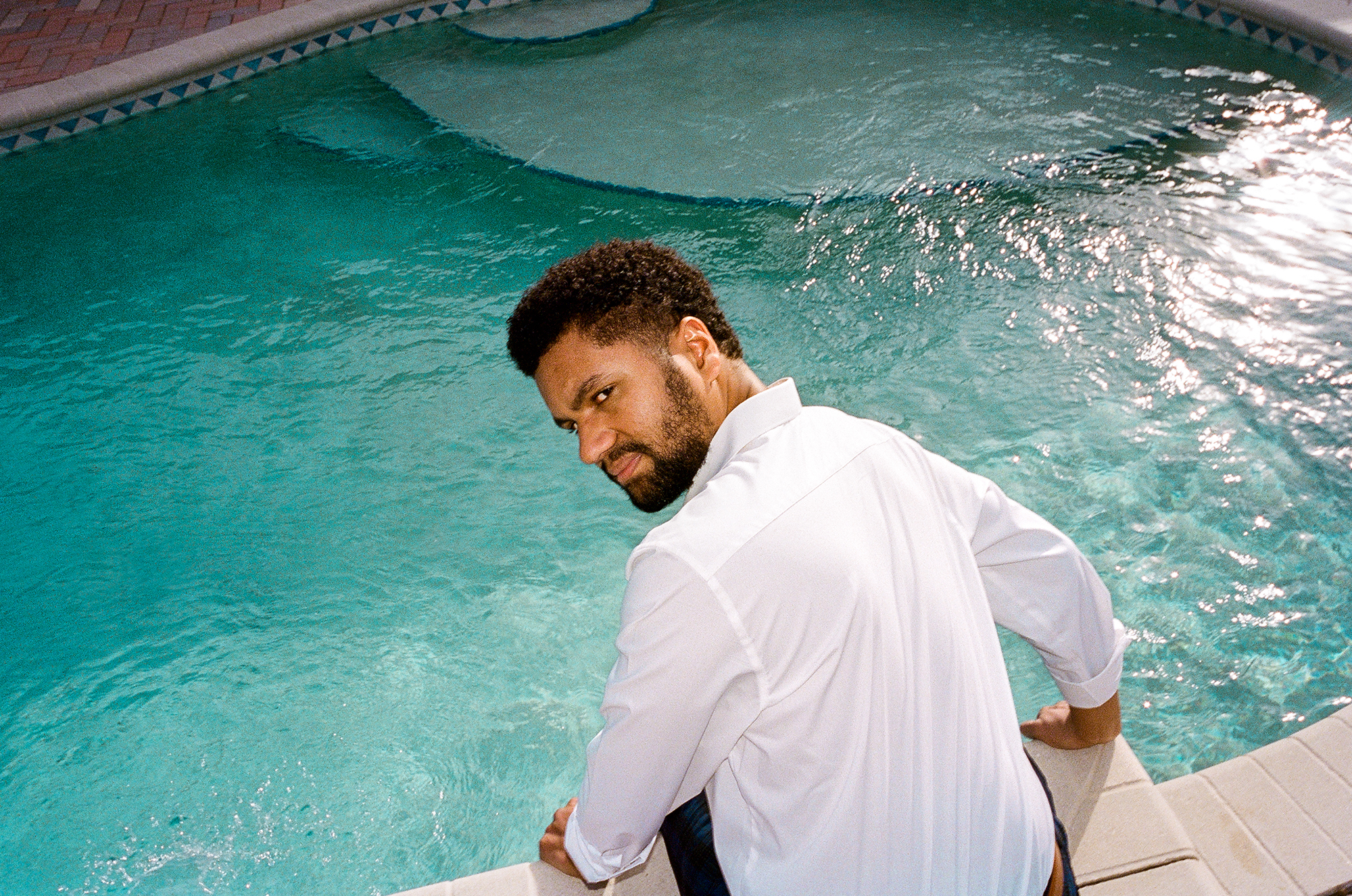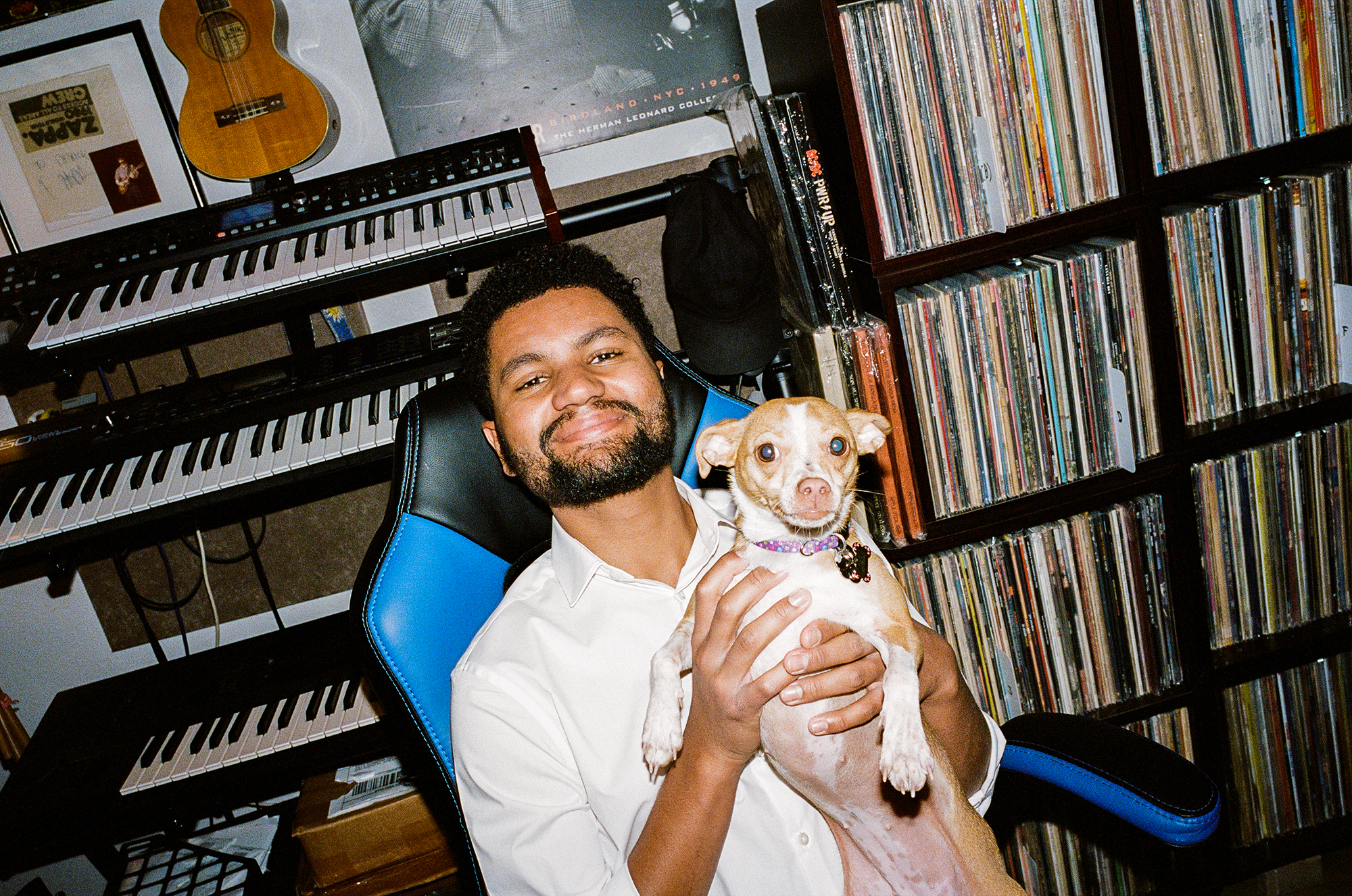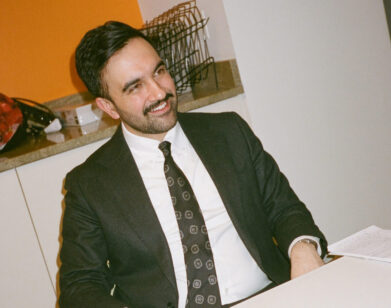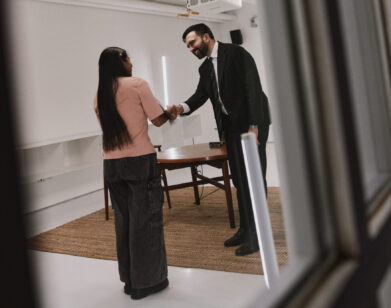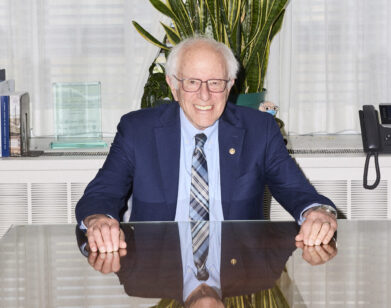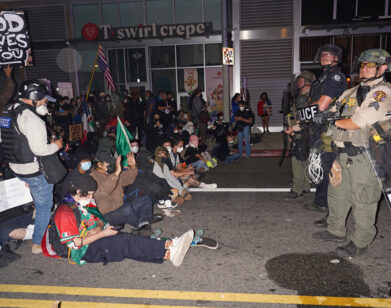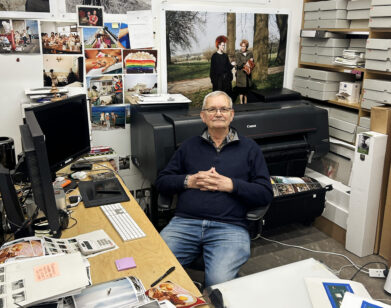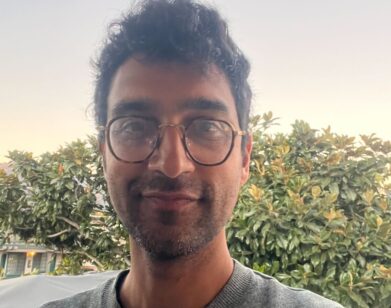POWER
Gen Z Congressman Maxwell Frost Is Demystifying the Political Game
TUESDAY 2PM JAN. 10, 2022 WASHINGTON, DC
It’s Maxwell Frost’s third day on the job as the youngest U.S. congressperson ever when he sits down for an interview with fellow Florida activist Brandon Wolf. The call was meant to happen days ago, but when the Republican Party decided to hold the 118th U.S. Congress hostage with their historically delayed election of Kevin McCarthy for Speaker of the House, the 25-year-old had to reschedule several times as he waited to be sworn in. Now, ready to fight for the people of Central Florida, Maxwell lays out his vision for generational change.
———
MAXWELL FROST: Hey, Brandon.
BRANDON WOLF: Is that Maxwell? I mean, Congressman Frost.
FROST: [Laughs] No, no.
WOLF: How are you doing? Are you settling in?
FROST. I’m doing good. I’ve been feeling a little under the weather, but it’s not COVID. I think it’s just getting sworn in at like 2 a.m. and then having a week that puts a lot on the body. But I’m already feeling better and I’m excited to get home.
WOLF: Well, come home and soak up some sun as soon as you can. Okay, the first question I have is what I think most folks want to know. Most 25-year-olds are not actively thinking about running for elected office. I know I wasn’t when I was 25. Can you talk about what lived experience you had that made you enter politics?
FROST: Most of my work has been in organizing and advocacy, and what it came down to was speaking with local organizers, people I protested with, especially during Black Lives Matter, and having folks just mention, “Hey, you should look into running for office.” First thing I said was, “Hell no!” It was not in the cards for me. I didn’t think it would be the right move. Also, a lot of the things my opponents said about me during the election—“You’re too young, you’re too inexperienced”—I said about myself. It took me months to find the courage to even hop into the race. Even while I was at it, I felt a lot of impostor syndrome.
WOLF: That’s understandable.
FROST: But what changed everything was connecting with my biological mother and learning about her story—how it connected to all the issues and solutions that I believe in. It helped me draw this picture of how my direct advocacy is connected to my community, and moreover, connected to Central Florida. Obviously, we need morally just leaders in office to fight for us in D.C., but beyond that, they need to be able to fold into the great progressive organizing that’s already going on in Central Florida. I really do believe we have the opportunity to be a beacon of light in this state and show a way forward.
WOLF: I love that you talk about protest and direct action on the ground. One thing you tweeted really stood out to me. It was a picture of your mugshot from the Black Lives Matter protests of 2020 alongside your headshot as a member of Congress. You were maced, tear gassed, and jailed for nonviolent protests, and as you said in that post, you’re now going to be representing those very same streets in Congress. Can you talk about what that feels like and why you think that’s an important contrast to make?
FROST: It’s important because I bring that experience to the table. I’m often asked about being Gen Z in Congress and the thing I always try to say is, “Look, I’m not coming to the table saying, ‘Alright, my mindset is that I’m the Gen Z guy here, let me Gen Z it up or whatever.’” No, I’m coming as my authentic self, and when you do that, you bring the experiences with you. Every decision you make, every word that comes out of your mouth, should be based upon those experiences. So my point was really like, “Listen, now somebody who comes from that movement, who has been arrested, who’s been tear gassed for a nonviolent protest in their town, is going to be representing that same town in the United States Congress.” There’s value to have that experience because when we think about different bills as far as voting rights, criminal justice reform, poverty, and building an economy that works for everybody, I’m thinking about all the experiences I bring to light. And those protests were such a pivotal moment in our country’s history that I think it’s worth celebrating and also worth knowing.
WOLF: Absolutely. I know it’s inspirational to those folks who are doing the work on the ground. I certainly speak for myself when I say we need far more community organizers in Congress than we have. Okay, you invoked Gen Z, so I’m going to go there. I know you’re not the ambassador for the entire generation, but you are the first Gen Z person elected to Congress. That comes with a lot—like I bet most people didn’t know what a “0.5 selfie” was before you got there. But your being there also serves to inspire young people to see themselves in this process, even as potential candidates down the road. You’ve been open about the process, demystifying it and making it accessible to young people.
FROST: A lot of what held me up when I was deciding to run was the fact that the process seemed so closed off. And that comes from someone who’s been working on campaigns since I was right out of high school. I didn’t really understand what life would look like as a member of Congress and flew in a little blind on the faith and trust of people in the community and the movement we’ve built. So I’ve been thinking, what are the things high school Max should have known or seen from his members of Congress? Sometimes it’s smaller things, like making a video about how office selection works. It’s a cool, quirky thing. Sometimes it’s bigger things like the Speaker’s vote and how it pretty much halts all district work, which has a direct negative impact on our constituents, on our people. So in terms of demystifying the process, the government is supposed to work for you, and when something’s working for you, you should know a lot about it. And that’s not the case right now. The only time you learn about government is in a textbook and if you see something bad on TV. You don’t hear about the good things and you don’t often see the process.
WOLF: You’re right, it’s supposed to be for the people, but in large part, we don’t know how the sausage is made or how the gears work. You were even honest about how difficult it was to get a second apartment in D.C. I know it sounded like the Republican research group learned for the first time that that can be a difficult process for people who are not independently wealthy. I wonder if there are other barriers you’ve identified along the way.
FROST: On the matter of transparency, one example is that during the Speaker’s vote, the way it works is that when the last Congress is adjourned and the next Speaker’s being chosen, there’s this limbo period where there are no House rules and essentially it allows C-SPAN to take control of the cameras in the gallery and zoom in on people. That’s why we’ve seen so much great content during the Speaker’s vote, like AOC talking with Matt Gaetz. People that you thought would never talk, talk. It really showed democracy in action and I think it’s a beautiful thing. But after the vote, the House rules force the cameras to go back to that single distant view we usually get. I already signed the first bill I’ve co-sponsored. It’s with Mark Pocan, who’s an amazing progressive advocate, to free the cameras. It actually has bipartisan support because it allows people to see democracy in action, see those conversations, see how this works, and allows government to be a bit more accountable to the people because they have more access. It all has to do with access and transparency—transparency about money and the way people spend their time. I’m also working to get big money out of politics so that the thing on our elected officials’ minds isn’t money for the next election. Unfortunately, due to our laws and the way our country works, money for the next election is a really big factor in the way that people legislate. Working to unshackle our elections from that is going to be better for the country and better for our government.
WOLF: You’ll be serving in the minority in your first term. And to be frank, the majority is quite extreme. Can you mention some of the needs of Central Florida you hope to put on the table?
FROST: So many people are still looking for FEMA assistance from these hurricanes, still looking for help, and it is important we lean in on that. I’m honest with people. I ran on a platform of health care for all, ending gun violence, protecting the rights of body autonomy, et cetera. I never said, “These are the things we’re going to get if you elect me.” It was always, “This is what I believe. This is my North Star. This is the world that I’m going to fight for.” And so looking at the landscape, we see that with this far-right Republican slim majority, we’re not going to have bold, transformational change in the next two years. I don’t say that to be pessimistic or make people less excited to fight, but it’s important that we understand the expectations. They’re going to be investigating Hunter Biden and China and being completely xenophobic, transphobic, racist, and anti-Semitic while they do it. I want Central Florida to know that you’re going to have a fighter to fight against that in a community that’s one of the top five communities in the country for LGBTQ+ folks, in a community where our Latino population is growing on a daily basis, in a community where our Black folks are continuously having problems with housing. So is everybody. I want people to know that we have a big fight over the next two years here in D.C.
WOLF: You mentioned some of the things that make Central Florida great. I would encourage folks who are reading, come and visit us. I know that Florida gets a bad rap, but this community is beautiful. It’s diverse and it has a lot to offer. I wonder if you can just briefly talk about what we’re up against here. We know that the state’s become ground zero for Republican efforts to marginalize and discriminate against people, especially LGBTQ people. What do you see as some of the biggest threats we’re facing in Florida over the next few years?
FROST: The governor targeted many marginalized communities in many different ways, but over the past year, we’ve seen him narrow in the bulk of his oppression on queer folks, and specifically children and drag queens in our LGBTQ+ community. It’s really important that we keep this in mind, and we need to pass federal protections. There’s different ways we can do this. Number one, we need to pass the Equality Act. It’s a shame that there’s not already legislation to quantify a lot of the protection needed for our LGBTQ+ community, but also our disabled community and just different folks. It’s important people realize that it’s a bill that impacts a lot of different communities and it needs to be passed and signed by the president. The other thing is we have an opportunity, since we have the White House, to work with the Department of Education to ensure that a lot of these attacks we’re seeing from Governor DeSantis on trans and queer youth are stopped at the federal level and made illegal. The other thing is that Governor DeSantis is really open about his hatred of immigrants and his willingness to use his office, use the budget and taxpayer money, to make jokes by human trafficking immigrants to houses in the middle of the night where it’s freezing cold, promising them jobs and a bright future, and they end up in some facility in New York or California or Washington, D.C. He is now even using the National Guard, not in a humanitarian way to help the Haitians and Cubans who have come to shore looking for a better life, but to criminalize them. This governor has failed to deliver on housing, ending gun violence, helping to fix our immigration system, and ensuring that working families, and everybody in Florida, has health care. Because he’s more interested in running for president than running the state of Florida, he’s going to continue these sideshows that aren’t just distractions. They have real actual impact that can lead to harm and death in our communities.
WOLF: What is your advice to young people who may be eyeing running for office or working on a campaign, but don’t know where to start?
FROST: I always encourage people to take a step back and really ask yourself, why are you running for that office? Because we live in a culture where a lot of times people run for office as a step to something else. That’s part of the problem. Our city council positions shouldn’t be seen as a stepping stone to anything. These are incredibly important positions that have very important functions. Think about what you want to do. What impact do you want to have? There’s so many things you can run for. Find the position that makes sense for you, who you are, what you believe, what makes you special, what you love, what you want to do.
WOLF: Absolutely. The only way to make things better is to stop having people who are running for a plaque on a desk or a pin on a lapel and find people who know why they’re running, know what parts of the community they want to impact and the value they want to add. I want to end by asking you, what is giving you hope right now? I think a lot of people can feel discouraged by the state of politics. Democracy is in peril. Climate change is barreling toward us. Gun violence takes a hundred people from us every day. It can feel like a lot. People often wonder what gets us up and motivates us to keep fighting every day. What’s yours?
FROST: The arts and music has always given me hope. Music is how I get through things. I’m always listening to music and I’m always immersing myself in different art. I used to say that art’s an escape. But it isn’t an escape, it’s our reality. Every time we talk about some of the good in life, whether it’s a vacation or art, we always describe it as an escape, which subconsciously is saying our life kind of sucks, because all the good things are escapes from our life. So I try to think, this is my life. This is the world I live in. This beauty and this vocation, all this is a part of it and I’m proud of that. It’s not something we should be ashamed of.

